Throughout the successive Iraqi elections, the religious and ethnic minorities have been subjected to the rivalry and influence of the political parties through which the minorities have also tried to secure their representatives. To preserve a baseline level of representation for minorities in the Council of Representatives, they comprise just under 3 per cent of parliamentary seats under a quota system.
Only nine of the 329 seats in the Council of Representatives are allocated to minorities across Iraq’s provinces. Five seats are allotted to the Christians, each of the other four to Feyli Kurds, Ezidis, Shabaks, and Mandaeans under the Parliamentary Electoral Laws.
In the last federal elections held in May 2018, more than 20 coalitions comprising nearly 100 candidates competed for the nine quota seats.
Several political parties and influential blocs included candidates from religious and ethnic minorities in their electoral lists to secure the minority vote, or they nominated their own members to run as candidates in minority coalitions in a bid to secure quota seats.
Christians: a majority of quota seats
In the Iraqi Council of Representatives, quota seats for Christian minorities have been allotted to the provinces of Baghdad, Nineveh, Erbil, and Duhok, for which more than seven political parties and dozens of candidates compete. In the Kurdistan Region, five seats are designated for Christians in the region’s parliament, in addition to quota seats on the provincial councils.
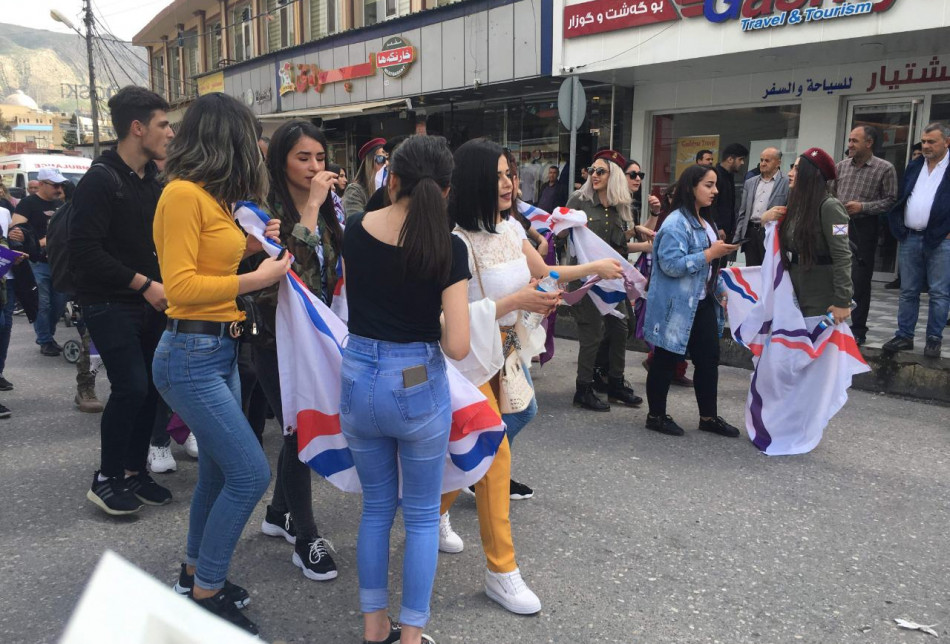
Duhok, Christian youths are celebrating one of their ceremonies, 2019. Photo: KirkukNow
A number of the Christian parties, some of which control militias, have an interest in aligning with the larger blocs. In the last federal elections, 70 Christian candidates competed to secure five quota seats.
“The rights of the minorities are not taken not into consideration at all; the majority decides on behalf of us, they impose the decisions on the minorities, so the quota seats have to be increased to prevent such violations,” said head of the Ethad Bayt al-Nahirain party.
They impose the decisions on the minorities, so the quota seats have to be increased to prevent such violations
Christian Yusuf Yaqub Mata believes that there are several reasons for the diminishing Christian vote, including emigration, which have prevented the community from electing genuine representatives and has left the constituency vulnerable to the influence of large political parties.
When the Islamic State (IS) took over Mosul in Mid-2014, the group offered Christians three choices: convert to Islam, pay Jizyah [Islamic tax], or leave the area. Most of them chose the third option and were displaced.
“The government should find a solution for the Christians’ problems so they can elect their genuine representatives and secure more quota seats,” Mata said.
The government should find a solution for the Christians’ problems
Mata explained that some of the laws and decisions of parliament and the electoral commission are not in the interest of Christians. Regulations require that voters have electronic cards to vote in elections, which the majority of Christians living abroad lack. They also provide for an inadequate number of polling stations in the European countries.
In the 1990s, the Christian population in Iraq exceeded 1.5 million, approximately three percent of the Iraqi population. The number dropped to around 800 thousand Christians before the US-led invasion of Iraq in 2003.
Currently, the Christian minority has been reduced to less than 500 thousand, according to a data KirkukNow obtained from Iraq's top Catholic cleric, Patriarch Cardinal Louis Sako.
The Feylis; A new experience with quota system
A parliamentary seat was designated for the Feyli Kurds in Wasit province for the first time in the 2018 federal elections. Numerous coalitions and political entities competed to win the seat.
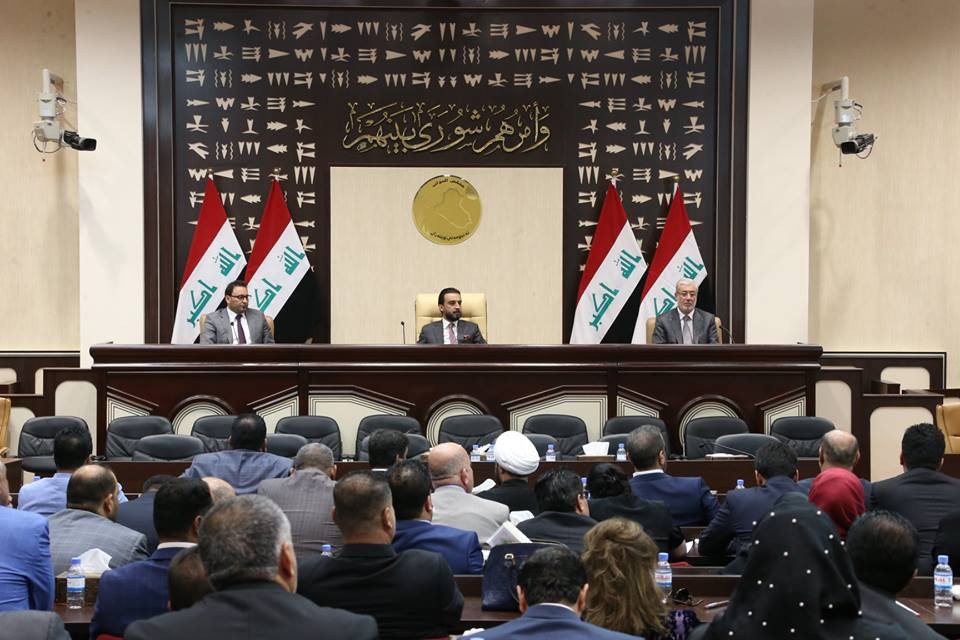
Baghdad, a session of the parliament, 2019. Photo: Parliament Media Office.
The Felyi Kurds also had seats in the Wasit and Baghdad provincial councils before the dissolution of the provincial councils in October 2019. However, no seats have been allocated to the group in the Kurdistan Region’s parliament or its provincial councils.
“Majority of the people who became parliamentarians or provincial council members through the quota, such as the Feyli Kurds, do not directly represent the minorities but rather, the parties that back them,” Jawad Malakshahi, a Kakai figure said.
Malakshahi thinks that the biggest obstacles to the Feylis in Baghdad are the mainstream parties during the elections.
“Those who are able to gain the Feyli quota seat are supported by the influential Shia parties, which do not consider the rights of the Feyli Kurds, and work according to their rules.”
Those who are able to gain the Feyli quota seat are supported by the influential Shia parties
The Feyli population is estimated at 800 thousand, the majority of whom reside in Diyala, Baghdad, and Wasit provinces.
Malakshahi claimed that the lack of a united Feyli coalition has led to the fragmentation of the constituency. Consequently, the community is unable to elect a representative to parliament that represents Feyli interests.
“I think the allocation of [just] one quota seat in Wasit is erasure; it is an obvious violation against the Feyli Kurds in Baghdad where most of the Feylis live. Surely, the seat will go to the Islamist Shia parties and we have no role in advancing our rights,” Malakshahi claimed.
It is an obvious violation against the Feyli Kurds in Baghdad where most of the Feylis live
The Feyli Kurds faced forced relocation, prosecution, and the revocation of their citizenship under the former Iraqi Baathist regime as they are both Kurdish and Shia. This crime was recognized as an act of genocide by Iraq’s Supreme Criminal Court in 2010.
The Kakais; an oppressed minority
The Kakai minority lacks representation in Iraqi political institutions, with the exception of a seat in the provincial council of the yet unformed Halabja province.
The Kakais have not been able to win a seat over the last several rounds of general elections even though their candidates ran in the elections.
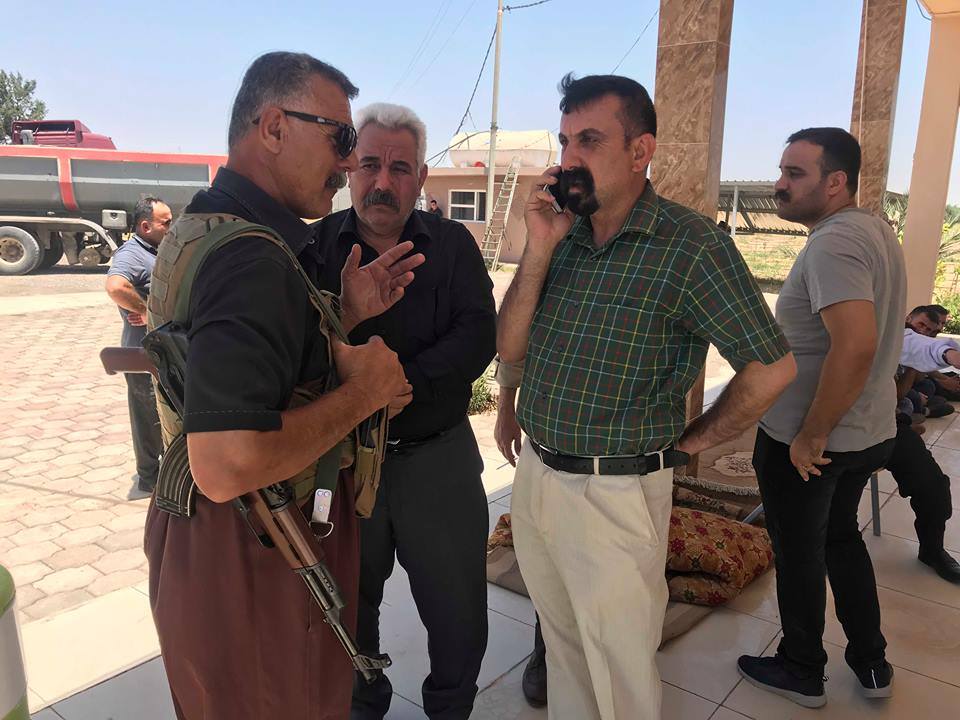
Kirkuk, Members of Kakai minority take up arms against insurgent groups that attack their villages in Daquq district, 2019. Photo: KirkukNow
Sardar Arjuman, head of a Kakai tribe, criticized the Kurdish and Arab parties for failing to recognize and mentions the Kakais’ rights during the drafting of the Iraqi constitution and to allocate quota seats to the group, adding that it is a clear violation.
“We became victims twice, for being Kurds and for being Kakais, because we have our own culture and faith, while we have always been subjected to the attacks of the armed groups,” Arjuman claimed.
We became victims twice, for being Kurds and for being Kakais
Members of the Kakai community live in many areas in Iraq including the Kurdistan Region, Nineveh, Kirkuk, Halabja, Erbil, Khanaqin, and other places in Diyala province. Unconfirmed figures show that the Kakai population is estimated at 100 thousands.
The Kakais have several religious shrines in Kirkuk, Nineveh, and Halabja but their faith is not officially recognized by the Iraqi constitution.
“The Kurdistan Democratic Party (KDP) and the Patriotic Union of Kurdistan (PUK) have only dealt with the Kakais for their own interests and used them for their election rivalries,” said, a Kakai tribal leader, “it is undeniable that these two parties have protected the Kakais, but have always used the them for their benefit.”
The Kurdistan Democratic Party (KDP) and the Patriotic Union of Kurdistan (PUK) have only dealt with the Kakais for their own interests
The Kakais have attempted many times to secure a seat under the quota system, but have been unsuccessful.
Almas Fazil, a member of the Legal Affairs Committee in the Iraqi parliament, said, “the [proposal for a] quota seat for Kakais did not gain enough votes because only four out of 15 committee members voted for it, so it was not added to parliament’s agenda to be voted on as part of the new electoral law.”
Shabak; A fragmented minority
The Shabak minority has one seat in the Council of Representatives as part of the Nineveh province delegation, which candidates from the electoral coalitions and the political parties strive to win.
In addition to their quota seat, Shabak minority also obtained seat with the Al Fatah Shia coalition in the 2018 general elections.
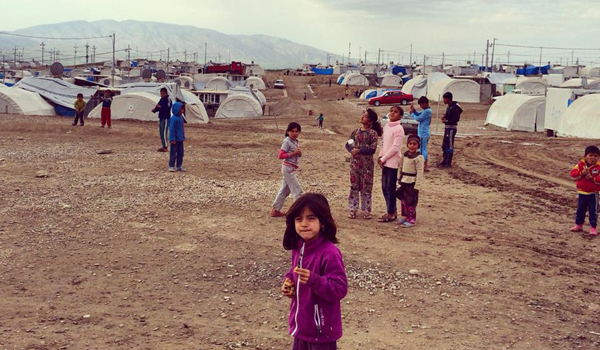
Duhok, the camp of Internally Displaced Persons (IDPs) of Shabak minority in Bardarash district, 2016. Photo: Exclusive to KirkukNow.
Ghazwan Dawdi, a Shabak from Nineveh province, told KirkukNow: “two primary fronts exist within the Shabak minority. 60 percent side with the Arab parties and the other 40 percent are with the Kurdish parties, the KDP in particular. So, their votes are divided and this has prevented them from selecting a bona fide representative [from the community].”
60 percent side with the Arab parties and the other 40 percent are with the Kurdish parties, the KDP in particular
Dawdi explained that if all members of Shabak minority vote for the group’s own candidates, they might acquire three seats based on the number of the Shabak voters.
The Shabak minority is estimated at 300 to 350 thousand people, 60 percent of whom are Shia, and 40 percent are Sunni. Most reside in Bartella, Bashiqa, Hamdaniya, Tel Kaif, Mosul, and the other villages in the Nineveh plains.
On the influence of the other political parties on Shabak minority, Azwan explained, “Agreements are made to form a list and unify the votes of the Shabak people prior to each election, but as soon as the elections approach, the agreements are nullified, resulting in a split in the constituency.”
As soon as the elections approach, the agreements are nullified
The Ezidis: a multi-party minority
The Ezidis, most of whom live in Nineveh province, have been allocated only one seat in the Iraqi parliament, for which over 50 candidates from Ezidi and other parties ran in the last federal elections.
According to Shahab Ahmad, “the Ezidis should reach an agreement among themselves to participate in the elections on a united list and to keep the number of the candidates low… so that their votes are not split.”
Ahamd, who is a displaced journalist in Shekhan IDP camp, believes that the conflict among the Ezidis and a significantly high number of candidates for the group’s one seat have resulted in wasted votes.
Ezidis obtained only one seat in the first Iraqi federal elections in 2005 because the Supreme Court’s decision ruling that a seat must be allocated for every 100 thousand members of an ethnic or religious minority was not given effect by the parliament.
Ezidis in Iraqi once numbered 550 thousand people. 360 thousand are displaced and another 100 thousands have migrated abroad according to the General Directorate of Ezidi Affairs in the Kurdistan Regional Government.
Alyas Khairi, a displaced Ezidi in Duhok, said that because of the lack of reconstruction and services Sinjar, very few Ezidis are preoccupied with thinking about elections and electing their representatives.
“Whoever is elected is not important for us, people are angry and frustrated because they know that the person who gets elected will not work for us," Khairi claimed.
They know that the person who gets elected will not work for us
In addition to their quota seat in the Council of Representatives, Ezidis have secured two seats in Nineveh by running on the Kurdish and Arab electoral lists.
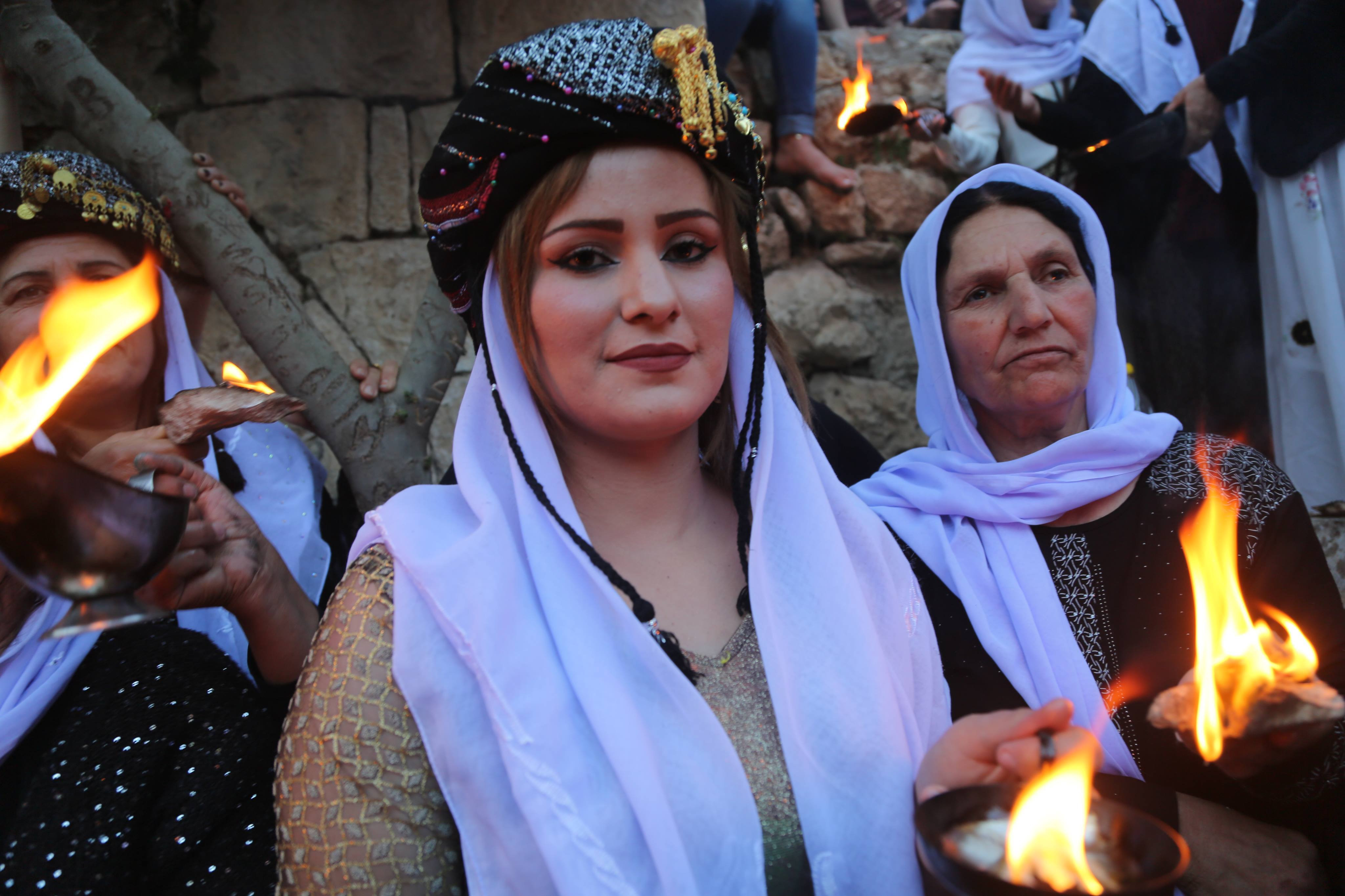
Lalish, an Ezidi girl celebrates the Red Wednesday ceremony. Photo: KirkukNow
Jundi Ismail, the secretary of the Ezidi Movement for Democracy and Reform, told KirkukNow, “the Ezidi parties compete for the quota seat while on the other hand Shia, Sunni, and the political parties of the KRG collect the Ezidi votes.”
“The Ezidis should try to win seats in addition to the quota seat through an alliance and a united list,” Ismail said.
The Ezidis should try to win seats in addition to the quota seat through an alliance and a united list
He also explained that last year, a coalition of Ezidi parties was formed but it collapsed.
Ismail said he believes that, “the Ezidi rights are being egregiously violated,” adding that the votes of the IDPs in Duhok, most of which were cast by Ezidis, were cancelled in the last elections.
The Ezidi rights are being egregiously violated
The Ezidi community has sought representation in the Kurdistan Region’s parliament, but its demand has not been addressed.
The Mandaeans: personal rivalries
The Mandaeans community has been allocated a seat as part of the Baghdad province delegation under the Iraqi electoral law. Six candidates ran individually to win the seat in the previous general elections.
Mandaeism, which emerged in the Rafidain Valley, particularly in the city of Ur in southern Iraq and around its marshes and rivers, is considered as the oldest religion in Mesopotamia. The religion has its own unique ceremonies and rituals.
The member of Mandaeans in Iraq is believed to be around 200 thousand, residing in Baghdad, Basra, Nasiriyah, Kut, Diyala, and Diwaniyah, particularly near the banks of the rivers.
The Mandaeans gained a quota seat in 2010 and they have a seat in the Baghdad provincial council. They also demand a seat in the Basra provincial council.
Note: Mohammed Almas and Amir Kahanqini have contributed to this article.





